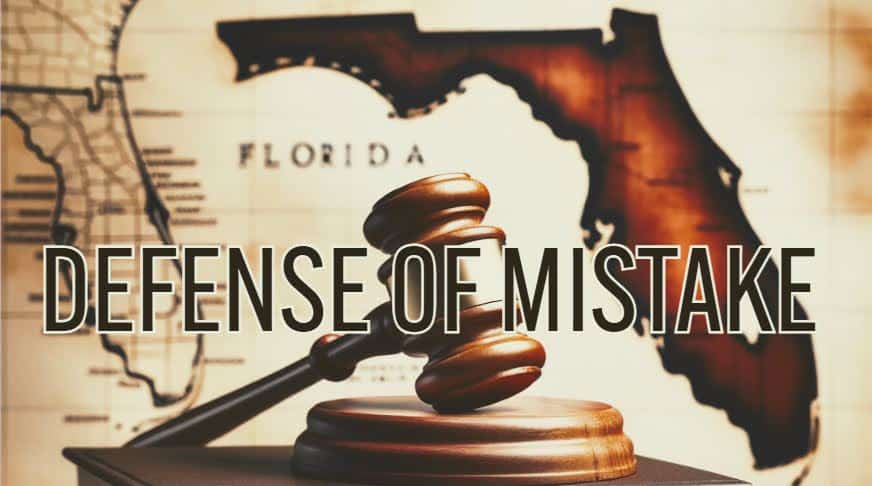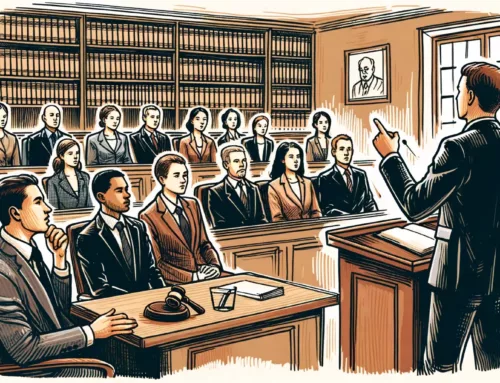When a Mistake of Fact or Law Can Be a Defense in Florida
If you’ve been charged with a crime in Florida, you may wonder if you can argue that you made an honest mistake. While a mistake doesn’t make your actions legal, in some cases, it can provide a defense that could lead to an acquittal or dismissal of charges. Let’s take a closer look at how mistakes of fact and mistakes of law work as criminal defenses under Florida law.
What is a Mistake of Fact?
A mistake of fact means you misunderstood or were unaware of key facts when you engaged in the criminalized conduct. For example, Jamie gets into a shoving match with a man at a bar who he believes is harassing his girlfriend. But the man was actually an undercover police officer trying to break up a fight. Jamie’s mistake about the man’s identity negates the intent required for battery on a law enforcement officer.
The mistake must be honest, meaning you sincerely believed in the mistaken facts. The law doesn’t excuse deliberate ignorance or refusal to discover the truth. The mistake must also be reasonable to negate general intent crimes like theft. But for specific intent crimes like battery, the mistake only needs to be honest, even if unreasonable.
So, if you had an honest, reasonable belief in facts that made your actions legal, if true, you may have a defense to criminal charges.
Common Uses of Mistake of Fact
Mistake of fact defenses often come up in theft and sex crime cases. In theft prosecutions, defendants argue they lacked intent to steal because they mistakenly thought the owner consented.
For certain sex offenses, like statutory rape, a defendant’s mistake about the minor’s age won’t provide a defense. Statutory rape is a strict liability crime regarding age in Florida. But mistakes of fact can potentially apply to other aspects, like the mistaken belief of consent.
Outside of theft and sex crimes, mistake defenses can work for any crime requiring intent if the mistake negates that mental state. For example, a battery defendant could argue they mistakenly believed the “victim” was about to attack them, making their actions self-defense.
But mistaken assumptions rarely excuse homicide due to the sanctity of human life. And they offer no defense to crimes with no mental state requirement, like traffic offenses.
Overcoming Strict Liability for Age
As mentioned above, statutory rape and other sex crimes against minors are strict liability offenses regarding the victim’s age in Florida. Defendants accused of these acts can’t escape liability by arguing they mistakenly thought the minor was older.
Florida Statute Section 794.021 specifically states that mistaken belief the minor was over 18, or even an intentional misrepresentation of age by the minor, are not defenses. Courts have upheld this law as constitutional, so arguments that it violates due process or privacy rights won’t prevail.
The policy behind this strict liability treatment is to protect minors from sexual abuse and exploitation. When adult-minor sex is criminalized, requiring knowledge of the minor’s age would undermine enforcement against predators who claim ignorance. So if you’re facing charges like statutory rape, focus your defense on arguments other than mistake of age.
When Mistake of Law Can Work as a Defense
In most cases, not knowing an act was illegal or misunderstanding the law is no excuse. Ignorance of the law and mistake of law are traditionally rejected as defenses because individuals are deemed on notice of criminal statutes. But Florida recognizes three exceptions where a mistake of law could potentially provide a defense:
- Lack of Fair Notice – You can argue you lacked fair notice of the law’s existence if it was never properly published or enacted. However, given today’s online access to statutes, lack of notice is hard to prove.
- Specific Intent Crimes Requiring Knowledge of Illegality – Certain statutes require prosecutors to prove the defendant knew the conduct was illegal. These “specific intent” crimes, which often use words like “willfully violates,” may allow a mistake of law defense.
- Good Faith Reliance on Counsel’s Advice – Acting on the advice of your lawyer can sometimes excuse mistakes of law for specific intent crimes. But the reliance must be in good faith, and the advice reasonable under the circumstances.
Let’s look at examples where each exception could apply:
- Lack of Notice – Steve is prosecuted under an obscure local ordinance prohibiting the use of metal detectors on beaches. But the town never properly published or codified the ordinance before enforcing it against him. Steve can argue he never received fair notice that his metal detecting was illegal.
- Specific Intent Crimes – Jane is prosecuted for willfully violating state financial regulations. She can claim she mistakenly believed her actions were legal under the regulations after reading them. If her mistake was genuine, it could rebut the government’s proof that she acted “willfully.”
- Good Faith Reliance – Joe is charged with insurance fraud, a specific intent crime. He can claim he relied in good faith on his insurance agent’s bad advice about submitting a questionable claim. If Joe can demonstrate his reliance was reasonable and in good faith, it may excuse his mistake of law.
Scope and Limits of Mistake Defenses
Mistake defenses have defined limits under Florida law:
- The mistake must be honest and reasonable (for general intent crimes) to rebut the mental state required.
- Mistakes about a victim’s age provide no defense to statutory rape and similar strict liability sex crimes.
- Mistakes must negate the specific intent required for the crime charged. A mistake irrelevant to the defendant’s actual mental state will fail as a defense.
- Mistakes cannot exonerate conduct society deems inherently unacceptable, like homicide against an innocent person.
- Claiming you didn’t know something was illegal rarely succeeds by itself. Prosecutors can argue ignorance or mistake don’t override constructive notice of the law.
Work with a Skilled Criminal Defense Attorney
Facing criminal prosecution is scary, especially if you feel you made an honest mistake. While mistake defenses can be difficult to win, an experienced criminal defense attorney may help get charges reduced or dismissed by raising valid mistake claims. An attorney can also advise if arguing a mistake seems fruitless or even counterproductive in a particular case.
The skilled criminal defense attorneys at our firm have extensive experience handling all types of criminal allegations in Florida. Contact us today for a free case evaluation and see how our skills and deep knowledge of mistake defenses could benefit your case. With the right presentation of the evidence and law, an honest mistake may still lead to a positive resolution. Don’t wait to get advice on your options.
CALL US NOW for a CONFIDENTIAL INITIAL CONSULTATION at (305) 538-4545, or take a moment to fill out our confidential and secure intake form.* The additional details you provide will greatly assist us in responding to your inquiry.
*Due to the large number of people who contact our law office requesting our assistance, it is strongly suggested that you take the time to provide us with specific details regarding your case by filling out our confidential and secure intake form. The additional details you provide will greatly assist us in responding to your inquiry promptly and appropriately.
THERE ARE THOUSANDS OF LAW FIRMS AND ATTORNEYS IN SOUTH FLORIDA. ALWAYS INVESTIGATE A LAWYER’S QUALIFICATIONS AND EXPERIENCE BEFORE MAKING A DECISION ON HIRING A CRIMINAL DEFENSE ATTORNEY ATTORNEY FOR YOUR MIAMI-DADE COUNTY CASE







